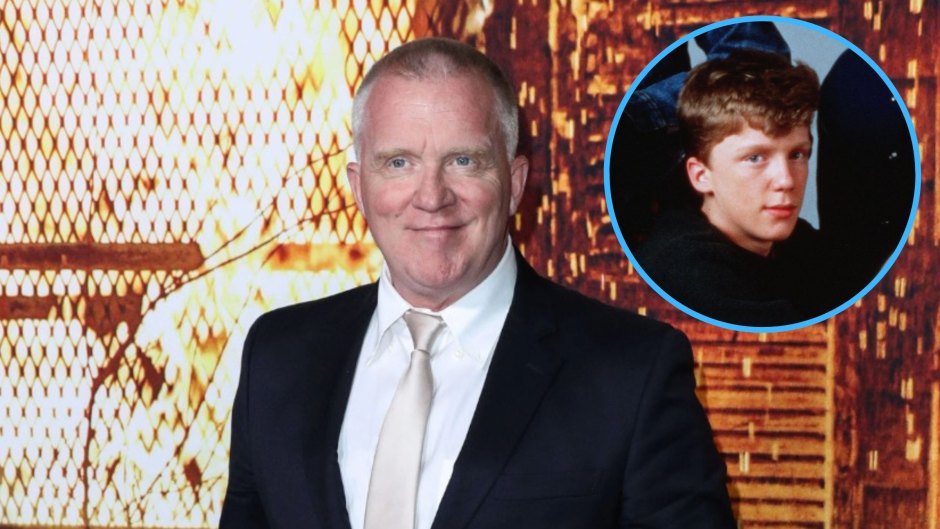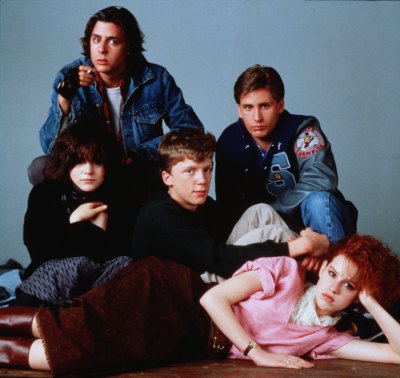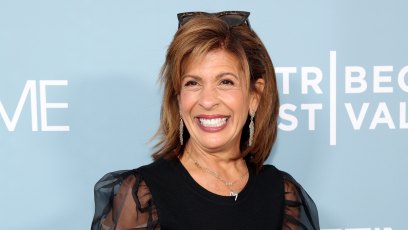
Shutterstock (2)
Anthony Michael Hall Reveals How He ‘Reinvented’ Himself in Adult Roles After Being a Teen Film Icon
There’s a moment in Anthony Michael Hall’s latest film, The Class, where his charismatic smile immediately reminds you of his nerdy, scene-stealing teen roles in The Breakfast Club, Sixteen Candles and Weird Science back in the ’80s. “I’ve always been sort of a grinner, because I got a complex when I had braces as a kid,” Anthony, 54, confides to Closer. “So I was always grinning instead of smiling with my teeth, like most normal people do. I have had a lot of awkward smiles in my life!”
Fondly remembering his early brush with fame, Anthony experienced a déjà vu feeling while starring in and executive-producing The Class, a sweet coming-of-age drama that was written as a tribute to The Breakfast Club. “It really took me by surprise. I never had any anticipation or thought of doing a film inspired by one of my other movies…. It felt like a real homecoming.”
What was it like to work on The Class?
“In the ’80s, I made a number of films in Chicago, so it was a lot of fun to land back there and to show my wife the town and to kind of re-experience it. I really loved it.”
What drew you to the project?
“I was really just taken by the screenplay. There’s a lot of real-world issues that have certainly existed since we made The Breakfast Club in the ’80s that are kind of perennial issues for people. But this film really humanizes all these kids’ characters with real conflict. So, whether it’s alcoholism, or their sexuality, or a life-threatening disease, the kids are all dealing with challenging real-world issues. It takes The Breakfast Club even further.”
In what other ways is The Class different?
“It is an homage to The Breakfast Club. It’s not a remake. It’s a much more multiethnic cast, which was important for us. I also think just in terms of the current climate in the world, particularly after the last three years, it’s become a very challenging world to live in. Between the pandemic and a lot of social issues that have arisen…it was important that our film reflected that.”

You worked with The Breakfast Club’s director, John Hughes, on Sixteen Candles. What was that like?
“I had the time of my life. And I gotta tell you, we just hit it off from the beginning, John and I. My memory of our time together and how we related interpersonally was that he was like an older brother. There was no sense of a 20-year age gap. He was a big kid.”
The Oscars paid tribute to John in 2010. What do you remember about that night?
“I feel like, often, comedies don’t get the acknowledgment that they deserve. So, when they paid tribute to John after his passing, I thought that was really nice. And it was very touching for all of us to be there. I’m a big fan of that notion that we’re all standing on the shoulders of giants in our upbringings, and I was really fortunate that John was one of those giants whose shoulders I got to stand on.”
Who else inspired you?
“Matty Simmons, who cast me in National Lampoon’s Vacation, and Harold Ramis. They actually were very similar in their vibe — they were always very joyful — and they really just had a love for people. I felt so blessed that as a kid, I got to work with a lot of these people.”
Incredible. Do you have any regrets about starting your acting career so young?
“I don’t know anything different. I’m really grateful for it, too, because it gave me a great boost of confidence and in some ways kind of kick-started my adulthood because it forced me to be more mature and to learn a business and to learn a craft. It gave me a sense of purpose and a direction in life that I love to this day.”
Were there challenging times, too?
“You know that quote by Winston Churchill, ‘If you think you’re in hell, keep going?’ Showbiz can be a temporary hell at times! But I have a thick skin, and I have a work ethic. So, I’m proud of my career and the course it’s taken, even with the setbacks and challenging periods, because it’s all part of it.”
How did you overcome the setbacks?
“I had made such a great early impression as a child actor and as a kid in my teens, but then I had to adapt to a new decade, literally, and reinvent myself. I think I’ve done that two or three times in my so-called adulthood. It makes you a stronger person because you realize what you’ve gone through and you can address the work with more humility and maybe a better sense of who you are. [It’s important] to be open to change to evolve and grow.”
What advice would you give young actors starting out?
“I remember doing TV shows in my 20s, where it felt like getting a big movie. On Diagnosis Murder, I was working with a legend like Dick Van Dyke. I remember doing Murder, She Wrote with Angela Lansbury, another legendary actor. But when I got those jobs, it mattered, like I was getting a big feature film. So, learning to appreciate the value of work, and just to hang in there — that stick-to-it-ness, if you will — all of those things really helped mature me as an actor at all stages in my career. Nothing is promised or given.”
Was there any film you turned down that you wish you hadn’t?
“Not really. John [Hughes] wrote Ferris Bueller for me, but unfortunately, I wasn’t able to do it because I was working on some other stuff. I don’t often mention those things, because I wish everyone success in life. I think that’s just the healthiest way to approach it all. And I thought Matthew Broderick was great [in the role].”
If you could, what wisdom would you share with your younger self?
“Well, in all honesty, [success] can be very intoxicating … and it can be very off-putting, too. I remember when, with the success that I had as a kid, it kind of freaked me out in a way. So, I think that if I could tell my younger self some things, I would say just to hang in there, and to stay humble, and to keep your eyes on the road. Stay focused on the work ahead.”






































